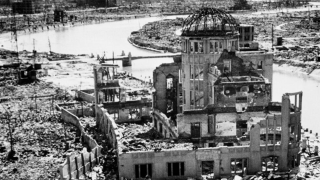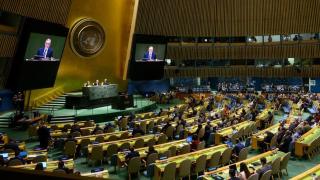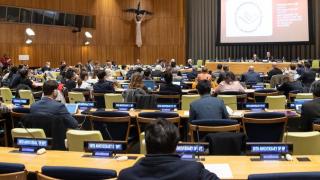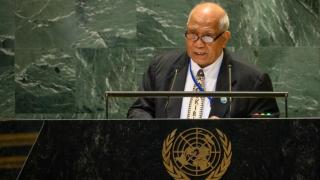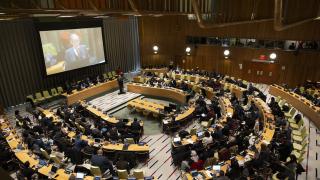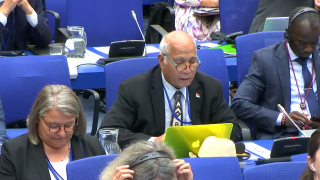
This week the Preparatory Committee for the 2026 Review Conference of the Parties to the Treaty on the Non-Proliferation of Nuclear Weapons is holding its first session in Vienna.
Alongside other urgent nuclear policy issues including heightened risks and the broader humanitarian impact of nuclear weapons, the conference gives a vital opportunity for nuclear-armed states including the UK to consider steps needed to help address the ongoing humanitarian and environmental impacts of past nuclear weapons activities.
For the first time, Kiribati and Kazakhstan have presented a working paper at the NPT Prepcom on the need to address the past use and testing of nuclear weapons. Both states have experienced devastating impacts from nuclear weapons; over 350 nuclear weapons tests have been conducted in the Pacific Ocean region and 468 nuclear explosions conducted in Kazakhstan. Last year, these states led efforts alongside others to seek acknowledgement at the NPT Review Conference and a call on NPT states parties to engage with efforts to address the ongoing harms caused to communities by the past use and testing of nuclear weapons.
In a joint statement at the NPT PrepCon general debate today, Kiribati and Kazakhstan called on Nuclear Weapon States to support nuclear justice initiatives in order to address the nuclear harm from the past development, testing and use of nuclear weapons. They urged Nuclear-Weapon States to provide adequate financial compensation and engage in information exchanges with States Parties whose territories served as test sites. This is much needed and long overdue; while more than 2000 nuclear tests have been carried out since 1945, there had been no global framework for addressing the humanitarian and environmental consequences of nuclear weapons until the Treaty on the Prohibition of Nuclear Weapons (TPNW) entered into force in 2021.
UNA-UK sees the TPNW as complementary to the Treaty on the Non-Proliferation of Nuclear Weapons (NPT) and Kiribati and Kazakhstan further highlighted how the NPT and the TPNW are complementary in their statement on Monday, where they stressed that the TPNW “adds a new dimension of international cooperation to assist victims of such testing and help remediate contaminated environments” as the first and currently only international legal framework to do so. Article 6 of the TPNW requires states parties to provide victim assistance and environmental remediation to those under their jurisdiction affected by nuclear weapons, and Article 7 requires all states parties who are able to provide assistance to affected states parties and to victims.
The UK has previously dismissed attempts to discuss nuclear testing impacts at the NPT - as well as rejecting the framework provided by the TPNW to address them. Last year in response to a parliamentary question the UK said:
The Government does not believe the Treaty on the Prohibition of Nuclear Weapons (TPNW) will bring us closer to a world without nuclear weapons. The UK will not sign or engage with the Treaty. The Government firmly believes that the best way to achieve our collective goal of a world without nuclear weapons is through gradual multilateral disarmament negotiated using a step-by-step approach, under the framework of the Nuclear Non-Proliferation Treaty (NPT). The effects and consequences of nuclear testing are not part of the NPT. The Treaty related to the cessation of nuclear testing is the Comprehensive Test Ban Treaty (CTBT).
This approach is damaging and contradicts the NPT’s own 2010 Action Plan. The NPT is widely considered the cornerstone of international efforts on nuclear non-proliferation and disarmament. However, states have repeatedly undermined the NPT and it has been over a decade since the last time agreement was reached following the failed NPT conference last year. Unless the 2023 NPT PrepCom acknowledges the complementarity of TPNW to the NPT's work, the NPT will become further discredited.
UNA-UK urges states parties of the NPT including the UK to respond to Kazakhstan and Kiribati’s call for specific engagement in initiatives to address nuclear harm - including the work affected states are doing under the TPNW - and seize the opportunity to address the harms that the nuclear weapons testing and manufacture have caused and continue to cause around the world.
Addressing nuclear injustice in Kiritimati
UNA-UK is delighted to announce that in the upcoming months we will be sharing the findings of Dr. Becky Alexis-Martin, who is currently undertaking research in Kiritimati to take practical and academic steps towards understanding and addressing atomic epistemic injustice in Kiritimati.
This follows her work on the UNA-UK report: Addressing British nuclear tests in Kiribati where - together with Ben Donaldson (UNA-UK), Elizabeth Minor (Article 36) and Dr Matthew Breay Bolton - she discussed the harm caused by the UK’s tests in Kiribati in the context of new opportunities for recognition and remediation, given Kiribati’s role as a state party to the TPNW.
On her ongoing fieldwork, Dr. Alexis-Martin said:
It is exceptionally important to ensure that global policy participation is accessible to all communities affected by nuclear weapons. I hope that my current research will provide a framework that will facilitate and support community participation and understanding of the objectives behind Article 6 and 7 of the TPNW. Hopefully, this will empower the community with the knowledge to act in future."
UNA-UK very much looks forward to sharing Dr. Alexis-Martin’s research - watch this space for updates! For more on this issue, read the report: Addressing British nuclear tests in Kiribati.
Read more:
- ICAN TPNW Articles 6 and 7
- Read the Joint Statement on behalf of Kiribati and Kazakhstan at the 2023 NPT Preparatory Committee General Debate
- See the UN Preparatory Committee website
- Read the advanced version of Kiribati and Kazakhstan’s working paper: Addressing the Past Use and Testing of Nuclear Weapons
Photo: H.E. Ambassador Teburoro Tito delivers a joint statement on behalf of Kiribati and Kazakhstan at the 2023 NPT Preparatory Committee General Debate. Source: still from video by United Nations Office in Vienna.

